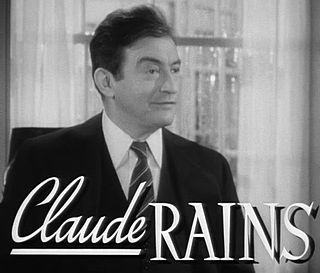
William Claude Rains was a British and American actor whose career spanned almost seven decades. After his American film debut as Dr. Jack Griffin in The Invisible Man (1933), he appeared in The Adventures of Robin Hood (1938), Mr. Smith Goes to Washington (1939), The Wolf Man (1941), Casablanca (1942), Kings Row (1942), Notorious (1946), Lawrence of Arabia (1962), and The Greatest Story Ever Told (1965).

Merle Oberon was a British actress who began her film career in British films as Anne Boleyn in The Private Life of Henry VIII (1933). After her success in The Scarlet Pimpernel (1934), she travelled to the United States to make films for Samuel Goldwyn. She was nominated for the Academy Award for Best Actress for her performance in The Dark Angel (1935). Oberon hid her mixed heritage out of fear of discrimination and the impact it would have had on her career.

These Three is a 1936 American drama film directed by William Wyler and starring Miriam Hopkins, Merle Oberon, Joel McCrea, and Bonita Granville. The screenplay by Lillian Hellman is based on her 1934 play The Children's Hour.

Carl Esmond was an Austrian-born American film and stage actor, born in Vienna, Austria-Hungary. Although his age was given as 33 in the passenger list when he arrived in the USA in January 1938, in his naturalization petition his birth year is stated as 1902. His stage names were Willy Eichberger and Charles Esmond and finally Carl Esmond. He trained at Vienna's State Academy of Dramatic Arts, and made his film debut in the operetta The Emperor's Waltz (1933). He was active in the Viennese genre of shallow romantic comedies so popular in the Austria of the interwar period.

Berlin Express is a 1948 American drama film starring Robert Ryan, Merle Oberon and Paul Lukas and directed by Jacques Tourneur.

Charles Korvin was a Hungarian-American film, television and stage actor. He was also a professional still and motion picture photographer and a master chef.

Wuthering Heights is a 1939 American romantic period drama film directed by William Wyler, produced by Samuel Goldwyn, starring Merle Oberon, Laurence Olivier and David Niven, and based on the 1847 novel Wuthering Heights by Emily Brontë. The film depicts only 16 of the novel's 34 chapters, eliminating the second generation of characters. The novel was adapted for the screen by Charles MacArthur, Ben Hecht and John Huston (uncredited). The supporting cast features Flora Robson and Geraldine Fitzgerald.

Men of Tomorrow is a 1932 British drama film directed by Zoltan Korda and Leontine Sagan, produced by Alexander Korda and written by Anthony Gibbs and Arthur Wimperis. It stars Maurice Braddell, Joan Gardner and Emlyn Williams and features Robert Donat's movie debut. Robert Donat and Merle Oberon were given top billing when Men of Tomorrow was distributed in the United States in 1935.

Ludwig Stössel was an actor born in Lockenhaus, now Austria, then Hungary. He was one of many Jewish actors and actresses who were forced to flee Germany when the Nazis came to power in 1933.

Forever and a Day is a 1943 American drama film, a collaborative effort employing seven directors/producers and 22 writers, with an enormous cast of well-known stars.
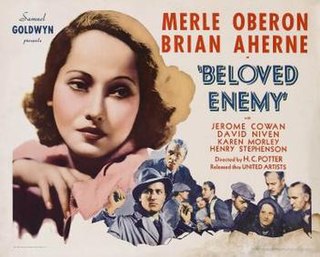
Beloved Enemy is a 1936 American drama film directed by H.C. Potter and starring Merle Oberon, Brian Aherne, and David Niven. It was loosely based on the life of Michael Collins.
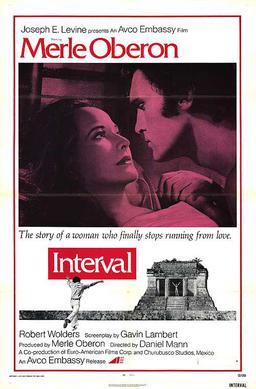
Interval is a 1973 romantic drama film starring Merle Oberon in her final performance. Oberon also produced the movie, and fell in love with her co-star in it, Robert Wolders, divorcing her husband to marry Wolders in 1975.
Ebb Tide is a 1932 British drama film directed by Arthur Rosson and starring Dorothy Bouchier, Joan Barry, George Barraud, and Merle Oberon. It was shot at Elstree Studios and on location in London. The film's sets were designed by the art director Holmes Paul. It was produced and distributed by the British branch of Paramount Pictures as a quota quickie. It was based on the novel God Gave Me Twenty Cents by Dixie Willson, which had previously been made into a 1926 American silent film of the same title.
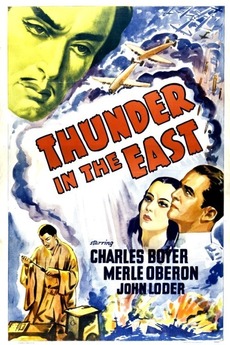
The Battle is a 1934 Franco–British co-production English language drama film directed by Nicolas Farkas, and starring Charles Boyer, Merle Oberon and John Loder. It was adapted from a 1909 French novel by Claude Farrère entitled La bataille.

Temptation is a 1946 American film noir thriller film directed by Irving Pichel and starring Merle Oberon, George Brent, Charles Korvin and Paul Lukas. The film was based on Robert Smythe Hichens's 1909 novel Bella Donna. Other film adaptations of the novel were produced in 1915, 1923 and 1934.

First Comes Courage is a 1943 American war film, the final film directed by Dorothy Arzner, one of the few female directors in Hollywood at the time. The film was based on the 1943 novel Commandos by Elliott Arnold, adapted by George Sklar, with a screenplay by Melvin Levy and Lewis Meltzer. It stars Merle Oberon and Brian Aherne.

Night in Paradise is a 1946 American Technicolor fantasy comedy film directed by Arthur Lubin and starring Merle Oberon, Gale Sondergaard and Turhan Bey. It was produced by Walter Wanger for distribution by Universal Pictures.
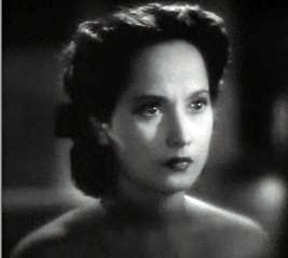
Affectionately Yours is a 1941 American romantic comedy film directed by Lloyd Bacon and starring Merle Oberon, Dennis Morgan, and Rita Hayworth.
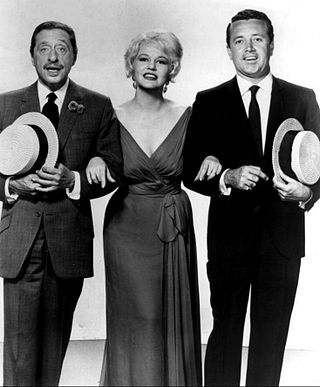
The DuPont Show of the Week is an American television anthology drama series that aired on NBC from September 17, 1961 to September 6, 1964. During its time on the air, the program "was NBC's late Sunday evening 'class' showcase".
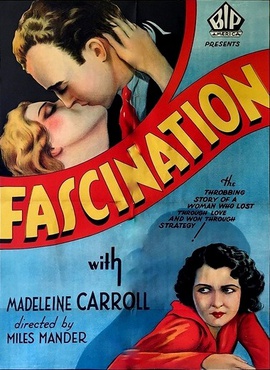
Fascination is a 1931 British drama film directed by Miles Mander and starring Madeleine Carroll, Carl Harbord and Dorothy Bartlam. It was made by British International Pictures at the company's Elstree Studios near London. The film's sets were designed by the art directors Clarence Elder and David Rawnsley.


















